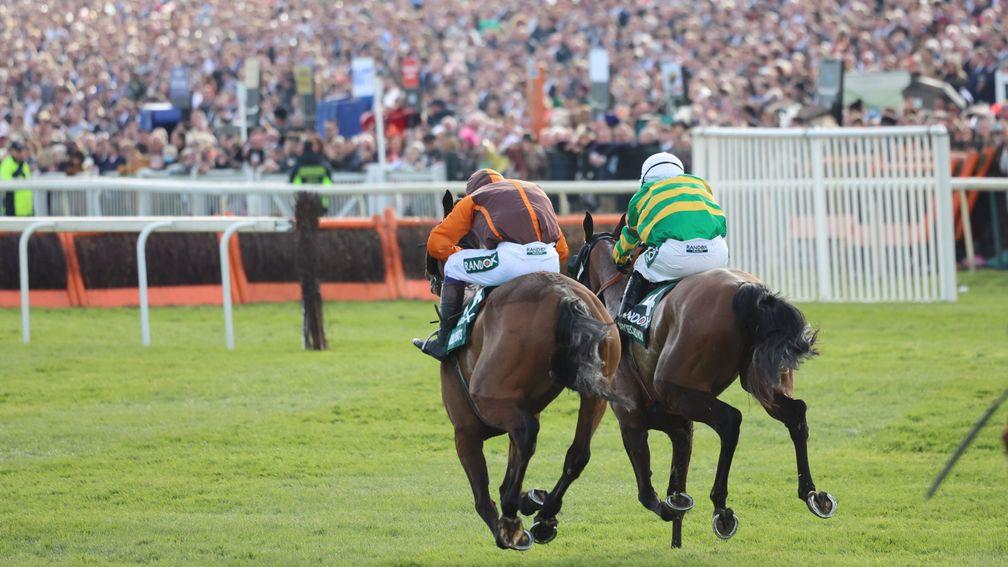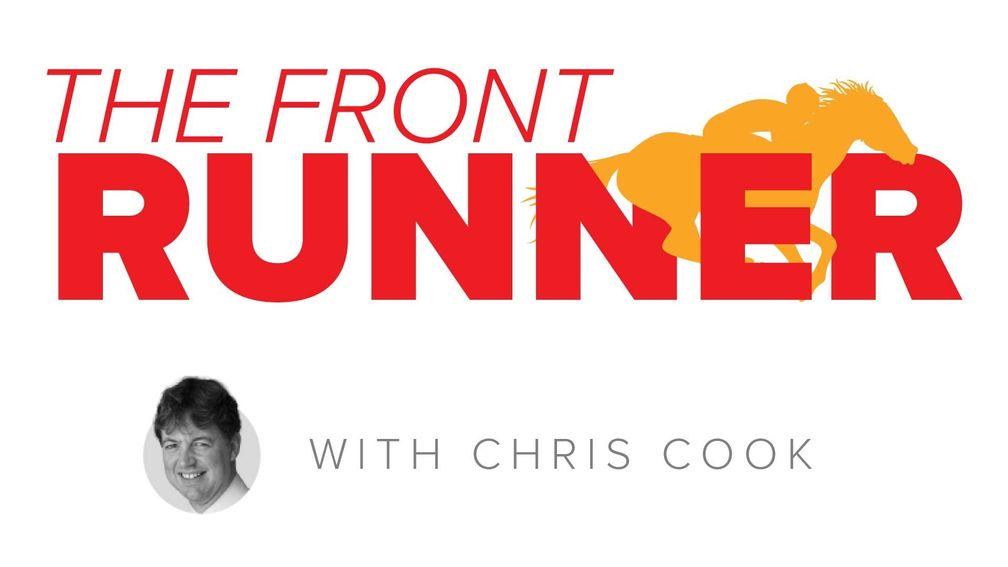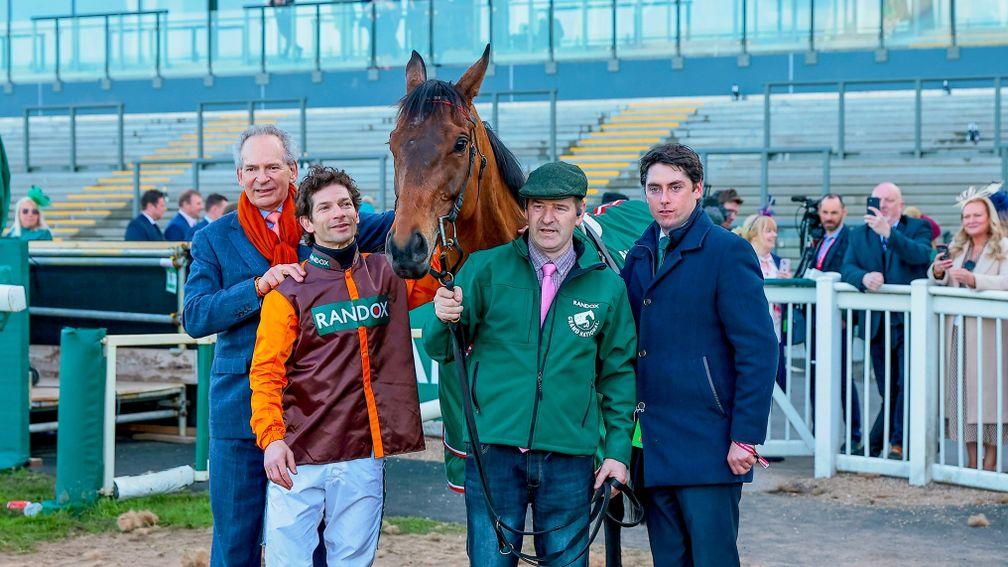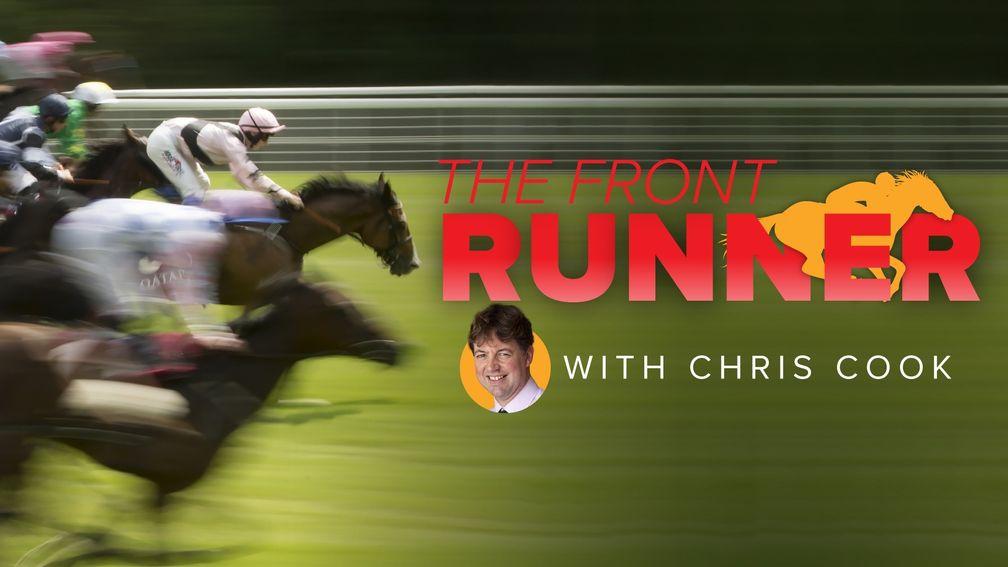The youngest winner since 1940 - how do we make sense of historic National?

The Front Runner is Chris Cook's morning email exclusively for Members' Club Ultimate subscribers, available here as a free sample.
In Monday's email Chris reflects on the remarkable result in Saturday's Randox Grand National – and subscribers can get more great insight, tips and racing chat from Chris every Monday to Friday.
Members' Club Ultimate subscribers who aren't yet signed up for The Front Runner should click here to sign up and start receiving emails immediately!
Not a Members' Club Ultimate subscriber? Click here to join today and also receive our Ultimate Daily emails plus our full range of fantastic website and newspaper content, including tipping from the likes of Pricewise and Paul Kealy, all the big interviews and features, daily comment and news analysis.

It's amazing to me how much history is being made in Grand Nationals just now. No repeat winners since Red Rum, until Tiger Roll came along. No successful female jockeys, until Rachael Blackmore last year. And now we've got the youngest winner since Neville Chamberlain was prime minister.
Which of these is more likely to be indicative of lasting change? I'm thinking we may get ten more winners ridden by women before we get another one as young as Noble Yeats.
As we saw on Saturday, it is possible for a seven-year-old novice chaser to win a Randox Grand National but that may continue to be a rare event and I'd be wary of drawing any conclusions along the lines of: "This is the new normal".
The race was still its old, scary self when Bogskar prevailed, the most recent seven-year-old winner before Noble Yeats. That was all the way back in 1940, two months before the evacuation of Dunkirk. His jockey was Flight Sergeant Mervyn Jones, on day leave from the Royal Air Force.
Together, they jumped the National fences as they used to be, with the wooden stakes in the middle so you couldn't just brush through them and the stomach-churning drops on some landing sides. Despite his tender years, Bogskar won because he was tough enough and, as with all National winners, because he was able to outrun the handicapper's assessment of his ability.
It can't have seemed an unusual result at the time because seven-year-old winners were far from uncommon. Indeed, any trends fan would have been focused on the youngsters; horses of that age had won four of the previous 11 Nationals, including Gregalach in 1929 when a record 66 runners took part.
In fairness, the ditch in front of the Canal Turn fence was filled in before Gregalach's triumph, so perhaps 1920s punters took that result as a sign the race had gone soft. Judge for yourself but "extremely demanding" seems a better description to me.
There was a fair sprinkling of seven-year-olds in the years before that, and even younger horses. Lutteur was the most recent five-year-old winner in 1909.
My tentative explanation would be that people in those times were more prepared to risk young horses, with the greatest determining factor being whether the owner wanted to run. As the game became more professional in the post-war years, orthodoxies began to be established, including that a horse of at least eight years was wanted for such a stern test.
Seven-year-olds still took part but by the time of the Red Rum era of the 1970s, there would be one a year if any. I started going to the National in 1984 and in my first three visits the only seven-year-old runner was Dudie, the tearaway leader who got tired and fell at the 19th in Last Suspect's year.
But Martin Pipe, with his focus on speed, was prepared to run seven-year-olds and may have helped make the idea a bit more popular. For the last 20 years, they've been averaging two runners a year.
It didn't seem to be leading anywhere when, back in 2010, I noted that two-thirds of seven-year-old runners in recent Nationals had lost their jockey at some point in the race. "A horse needs maturity to tackle unfamiliar obstacles while other horses are crashing about on all sides," I wrote, but of course maturity is not the same as age.
Noble Yeats was up to it. Most seven-year-olds will not be.
That being said, I shall give the closest inspection to anything Emmet Mullins sends for future Nationals, whatever age they are. He has made a huge impact in his first seven years with a licence and memorably won with four of his nine runners in Britain last season. This feels like the early stages of a really significant career.

I did worry a bit about whether things were going so well for him this term. He was 0/12 in Britain before the National, including a disappointing joint-favourite in the first race on Saturday. In Ireland, he is 1/48 since the start of December, his worst spell for three years. On top of all the other issues with Noble Yeats's profile, it was off-putting.
Emmet Mullins: I don't know when unbelievable Grand National win will sink in
But how good does Wetherby's Towton Chase look now? Ahoy Senor won, while Noble Yeats was not under tremendous pressure to be second. The third horse was then fifth in the Scottish National, the disappointing fourth found his form to score next time at Uttoxeter.
And then, of course, Ahoy Senor bolted up in a Grade 1 on Friday. Hopefully, a lot of you saw that as your cue to take a chance on Noble Yeats. Odds of 50-1 account for a lot of risk, after all.
But, if you did, I think you owe a lot to Mullins's foresight and determination to maximise his horse's chance. Noble Yeats was one of three horses who went early to post, avoiding the worst of the pre-race kerfuffle in the paddock area, and was also one of two horses to wear earplugs to the start. He may have won anyway but I can remember backing at least one National runner who boiled over before the tape went up.
Why don't more trainers ask for permission to send their horse early to post? Should the stewards be granting such permission? It reminded me of comments made by Patrick Mullins after last month's Supreme, in which the first two horses had skipped the pre-race parade. "It should be the same for everyone," he said.
While delighted for the winners, I felt for Ted Walsh, whose campaigning of Any Second Now has been so astute over several years. The horse is an ideal National type but he missed his first chance through the Covid abandonment of 2020, was terribly unlucky last year and has now been a gallant second, giving 12lb to the winner and beating everything else 20 lengths.
Next year, Any Second Now will be 11 and I don't suppose he will have come down the handicap very far. It looks like he's destined to be one of those who repeatedly shone at Aintree without getting the glory. You'll have your own list but I think of Greasepaint, Young Hustler, Suny Bay and Clan Royal among others.
It was upsetting to learn on Sunday morning that Discorama and Eclair Surf had not survived the injuries they suffered in the race. All our old worries about the risks posed by the race are now back. Once more, we'll have to chew over the question of whether changes are necessary. I'll return to this subject during the week after giving it some more thought.
On the relatively trivial subject of my own fancies, Enjoy D'Allen managed to fire Conor Orr out of the saddle at the first fence, a deflating outcome for all concerned after months of build-up. I expected he would be ridden with some restraint, a strong pace seeming likely, but he was in the front rank. Like others before him, he didn't seem entirely comfortable approaching a fence at that pace, took an extra stride and ended up with his legs in the obstacle rather than soaring over it.
Domaine De L'Isle had my hopes up as far as The Chair. Held up initially, he could be seen making stealthy, smooth headway as the field thinned out around him and he had latched onto the back of the main group by the time they came back over the Melling Road.
He was maybe a length ahead of Any Second Now as they approached The Chair, at which his jockey could be seen pushing him out to meet it on an attacking stride. Domaine De L'Isle couldn't make the span and belted the fence with his back legs.
There was a long way to go but what a pity he lost the chance to belie odds of 125-1. He's got an entry in the bet365 Gold Cup and would be interesting if he turned up there, though I wonder if connections might prefer to have another go at the National next year.
Anyway, it's the Craven meeting tomorrow. Time to start thinking about smaller horses that don't take half an hour to reach top speed.

The Front Runner is our latest email newsletter available exclusively to Members' Club Ultimate subscribers. Chris Cook, a four-time Racing Reporter of the Year award winner, provides his take on the day's biggest stories and tips for the upcoming racing every morning from Monday to Friday
Published on inNews
Last updated
- Join Racing Post Members' Club for the very best in racing journalism - including Patrick Mullins' unmissable trip to see Gordon Elliott
- Racing Post Members' Club: 50% off your first three months
- Join the same team as Ryan Moore, Harry Cobden and other top jockeys with 50% off Racing Post Members' Club
- 'It’s really exciting we can connect Wentworth's story to Stubbs' - last chance to catch master painter's homecoming
- The jumps season is getting into full swing - and now is the perfect time to join Racing Post Members' Club with 50% off
- Join Racing Post Members' Club for the very best in racing journalism - including Patrick Mullins' unmissable trip to see Gordon Elliott
- Racing Post Members' Club: 50% off your first three months
- Join the same team as Ryan Moore, Harry Cobden and other top jockeys with 50% off Racing Post Members' Club
- 'It’s really exciting we can connect Wentworth's story to Stubbs' - last chance to catch master painter's homecoming
- The jumps season is getting into full swing - and now is the perfect time to join Racing Post Members' Club with 50% off